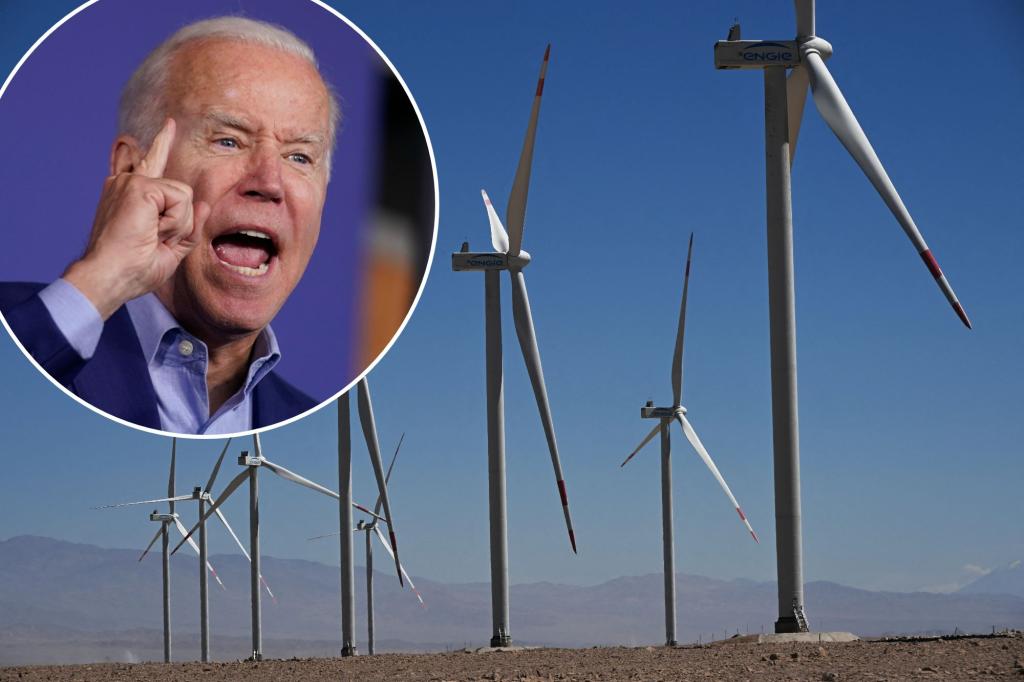opinion
A new book details how the federal government, despite its supposed best intentions, poses the biggest barrier to implementing 'green' energy initiatives .
Januario Helder/ABACA/Shutterstock
Surprisingly, the biggest enemy of environmental action in the United States for the time being is the US government itself.
Federal renewable energy permits often take years to be approved and come with (inevitable) local, state, and regional challenges.
Offshore wind power, with only 42 megawatts of installed capacity in the United States, is a case in point.
Compare this to China, which installed 17 gigawatts of offshore wind capacity last year. alone.
While countries like China (and European countries) are rapidly building offshore wind farms, the U.S. government approve Permit certificate for such efforts.
Solar and onshore wind projects face similar challenges due to their interconnectedness with our nation's complex, multi-state power grid.
A backlog in renewable energy grid applications is doubling the waiting time for these projects to start.
Similarly, America's nuclear energy sector has some of the most stringent restrictions and permitting regulations in the world.
In 2022, I toured the Vogtle plant in Waynesboro, Georgia, and the most common complaint I heard was about the cost and time that government regulations unnecessarily impose on each project. .
Indeed, it is well known that the Nuclear Regulatory Commission's (NRC) heavy-handed regulatory approach has made it nearly impossible to build new nuclear power plants in the United States over the past 30 years.
In 2009, the Georgia Public Service Commission approved construction of two new nuclear reactors at the Vogtle plant. But just three months later, the NRC decided to impose new rules that included a requirement that all new nuclear reactors withstand direct impact from large aircraft.
The factory was never built.
Other renewable energy sources, such as geothermal, are restricted by federal regulations.
Although the federal government considers only a limited number of locations suitable for conventional geothermal power generation, next-generation technologies such as horizontal drilling and hydraulic fracturing may eventually allow geothermal energy to be recovered almost anywhere. There is.
However, a major challenge for many states remains the permitting process for drilling wells on federal land, which accounts for about 90% of known geothermal potential locations.
Geothermal energy development must pass an environmental assessment, resulting in an average development schedule of eight years.
Government bureaucracy around conservation is also too restrictive, with harsh consequences for the fight against climate change.
For example, a forest thinning project in Northern California was recently blocked for more than a decade by unnecessary red tape created by activists who want to protect the endangered barred owl.
When the project was paused, wildfires tragically burned down 75% of the owl's habitat, and the amount of carbon dioxide released by wildfires that year reached 130 million tons (25 million tons). (equivalent to approximately one year's worth of pollution from cars). .
All of this could have been prevented by accelerating government approvals for forest management.
Contrary to the mainstream narrative, freeing governments from their own ways is the first step to scaling up environmental protections.
The federal government should intervene only when projects involve areas that span multiple states, such as rivers. If the project impacts public health, such as carbon emissions from forest fires. Or an action in one state can affect an entire industry, like California's stricter tailpipe emissions regulations, which forced automakers to make design changes and raise prices across the country.
Largely due to this government's overreach, America continues to fall behind as adversaries China and Russia rapidly build new projects for all energy sources.
Worse, most of the emissions reductions and clean energy projects promised in President Biden's Inflation Control Act will be impossible to accomplish if our government continues to stand in the way.
Washington certainly has a role to play in protecting the environment, but we cannot continue to allow bureaucracy to prevent good people, good ideas, and good projects from getting off the ground.
Therefore, we must cancel all unnecessary government barriers that bottleneck clean energy, environmental protection, and other environmental protection programs.
Local communities, economic markets, and entrepreneurs can solve most of these challenges on their own.
If we truly care about protecting the environment, we need to work across the aisle, eliminate government intervention, and accelerate America's clean future.
Adapted from Conservative environmental activist: Common sense solutions for a sustainable future by Benji Backer, with permission from Sentinel, a publication of Penguin Publishing Group, a division of Penguin Random House LLC. Copyright © 2024 by Benjamin Backer.
Load more…
{{#isDisplay}}
{{/isDisplay}}{{#isAniviewVideo}}
{{/isAniviewVideo}}{{#isSRVideo}}
{{/isSR video}}


